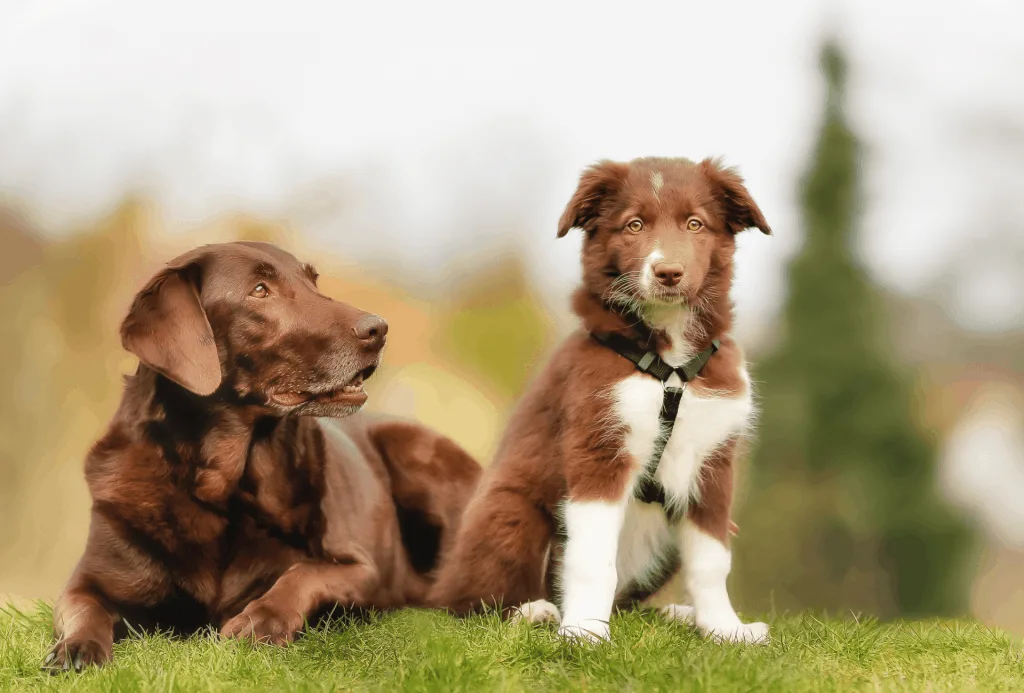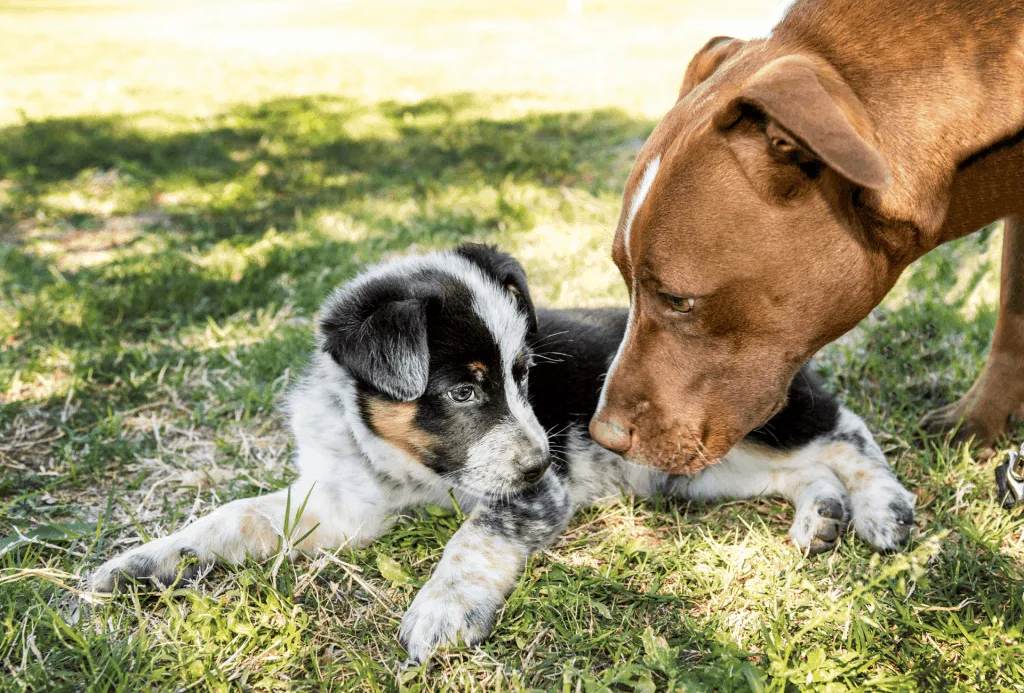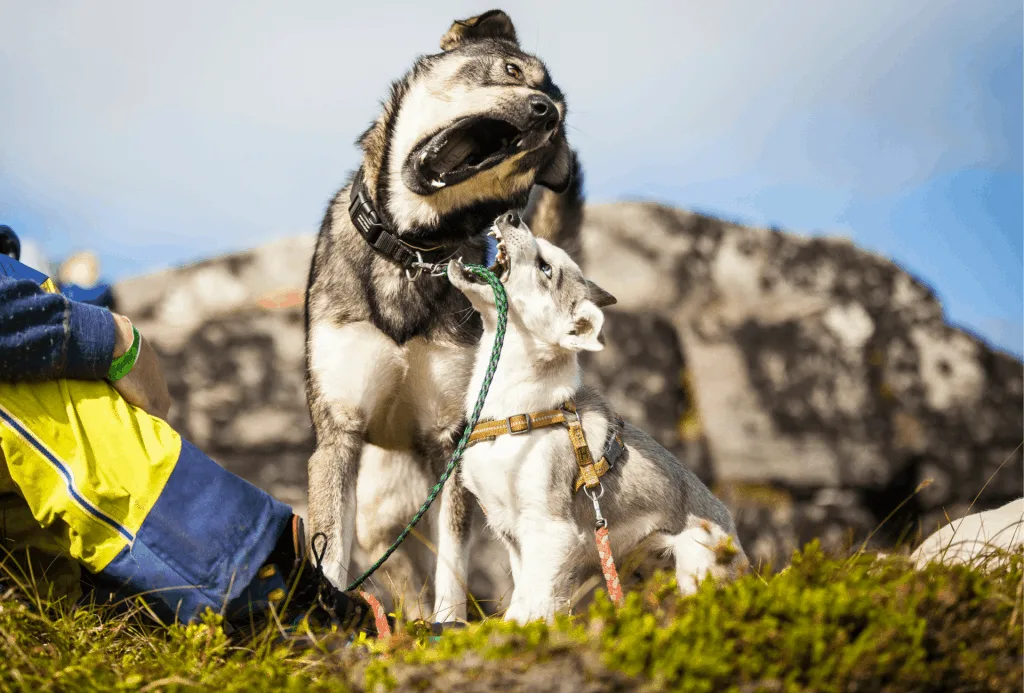Unfortunately, there are many articles dotting the internet that advise against adopting a new puppy with your senior.
Dogs are very social animals and desire interaction; don’t let these negative articles deter you.
Adopting a new puppy might just be one of the absolute best things you can do for your aging dog.
You’re afraid of potential conflict between your pup and older dog?
No worries, I’ve also covered the challenges that can come with introducing a puppy to your older dog.
Not all dogs are suitable for a pup.
Your grumpy ol’ senior may prefer staying alone for the remainder of their life.
Sick dogs or those not properly socialized may not be able to cope with the energy levels of a youngster.
Benefits of Getting a Puppy with an Older Dog
Getting a puppy with an older dog introduces a social partner for both, engages your senior in more playful behavior and exercise, and may increase your senior’s lifespan.
1. Social Interaction
Above all, dogs are social animals, having adapted to thrive in a group environment since the first Grey wolves roamed North America around 750,000 years ago.
Wild Grey wolves (and many other subspecies) still rely on their ‘pack’ family members for survival.
Few dogs will ever be truly happy isolated.
In fact, isolate any breed from social contact and you’re drafting a recipe for depression.
Aging dogs are already prone to increased anxiety, social problems, and depression before you consider the possible isolation of an extended workday.
Adding a new member to the family dynamic can be one of the best things you can do for your aging pet.
It’s also great for the pup as socialization is essential.
Socialization: Exposure to as many enjoyable sights, sounds, smells (i.e. enjoyable experiences) as possible; creating a sense of comfort and safety with these things.
Take a look at this article to learn about socializing your new puppy.
But not all dogs prefer the company of a pup or any other animal.
Independent breeds, shelter dogs, or just poorly socialized canines may prefer staying alone.
2. Play and Exercise
As a dog ages, his energy levels will decrease and metabolism begins to slow.
He won’t want to play for as long, and he will be more susceptible to weight gain.
Young puppies, on the other hand, seem to possess limitless energy.
They can’t often get enough physical stimulation.
In an ideal situation, your young pup will bring out a newfound zest for life in your older dog.

You might see an eagerness for life that you haven’t in years.
Because your older dog has found a new playmate, he’ll be able to burn off some of that excess energy he’s been bottling up.
This will result in a healthier dog, both physically and mentally.
3. Longer, Healthier Lifespan
With companionship ideally comes a reduction in stress and an increase in physical activity including play.
You’ll likely see physical improvements along with emotional in your older pet.
A happier dog, especially an older one, is less likely to experience medical problems.
Less anxiety means a healthier heart rate and lowered chances for heart disease.
As noted above, a more active, playful dog is less likely to suffer from obesity-related health concerns.
Take a look at this article if you still aren’t convinced getting a second dog is the right thing to do.
Older Dog Is Stressed By New Puppy
If your older dog is stressed by a new puppy it might just be an adjustment period. It’s best to provide seniors with a calm safe space and do bonding activities outside.
Sometimes you’ll have an older dog who wants nothing to do with this new ball of energy zipping all over the place.
Unfortunately, the pup can’t get enough of him.
What should you do? What can you do in order to accommodate the social needs of the younger pup while limiting the anxiety of the older?
First of all, identify the problem.
Before you do anything, you’ll need to figure out what the puppy is doing that causes stress for your older dog.
You can’t attack the problem until you know what is causing it.
Your solution should definitely not be separating the two forever.
That is nothing more than a bandage that won’t help if they encounter each other in the same home.
Socialization is key.
Most behaviorists would suggest careful desensitization training (see definition below) if your problem is simply one of unfamiliarity.
Make sure to gradually introduce both dogs to slowly extending playtimes, use plenty of enthusiasm, and incorporate things your older dog already loves.
Feed the dogs separately to prevent any resource guarding behavior (one dog is aggressive toward other around resources, i.e. toys, food).

Millions of humans take medication to treat emotional imbalances.
To some degree, a dog’s brain chemistry isn’t a whole lot different than ours, right?
Some people often take advantage of medication, even though the problem’s root lies in behavior.
Do not assume that the issues can be resolved with meds without digging as deep as possible and consulting behaviorists beforehand.
Veterinary science has advanced the ability of medicinal anxiety treatments for dogs, among countless other things.
Extreme discomfort or anxiety in an aging dog can easily result in both potential aggression and physical health problems.
Taking that into consideration, speak to your veterinarian about medicinal treatments for anxiety.
Never self-administer any psychoactive substances (i.e. THC) without consulting a veterinarian first, especially to an older animal.
Instead, gradually introduce your pup to your older dog, provide them a safe haven, go on adventures together, encourage play, but give your first dog privileges and rest.
Is it Fair to Get a Puppy with an Old Dog?
It might not be fair to get a puppy with an older dog if your senior is not properly socialized, is an independent breed, or sick.
This is a decision you’re going to have to make based on your older dog’s situation.
In most cases, getting a puppy with an older dog is a fantastic choice.
Are there reasons not to get a puppy with an older dog at all? Yes, definitely!
It’s not a good idea to get a puppy with an older dog if:
- Your older dog doesn’t like other dogs, and either fears or is aggressive toward them.
- Your older dog is suffering from failing health, or age-related mental health problems.
- You can’t provide the time and focus required to train the puppy, let alone supervise.
- You can’t financially support a new animal addition to your family.
- Your older dog has never been socialized well with other dogs.
- Your older dog suffers from post-traumatic stress due to an altercation with other dogs.
- You haven’t yet done your homework (see below).
At first, the list above might look long and frightening.
If you’re a devoted and educated dog owner and you can check everything with a resounding ‘NO’ to each of those, then you should be fine.
Will an Older Dog Hurt a Puppy?
A properly socialized older dog probably won’t intentionally harm a puppy, but seniors who have never been good with puppies might get irritated, ultimately resulting in your senior hurting the pup.
Dogs are intelligent animals, and very rarely attack other dogs for pleasure (as long as they aren’t trained to).
Your older dog is more likely going to love the companionship.

If introduced properly, your aging pet should grow to tolerate, even enjoy the presence of the new family addition.
There is still a possibility he won’t accept and actually harm the puppy if you aren’t vigilant.
What should you avoid?
If the energetic younger dog ends up accidentally harming the older during play, there is a possibility he could hurt the puppy in instinctive retaliation.
Most dogs will issue an audible or visual warning with a growl or snap.
Take a look at this article to read your dog’s body language and how it correlates to mouthing, nipping, and bite inhibition if you are worried.
Dogs don’t always think about the decision to bite before reacting to pain, as many of us imagine.
If you are still worried about potential altercations, take a look at the article I’ve written about How You Should Deal with Dog on Dog Attacks.
Resource guarding.
This is a very common behavioral problem for dog owners.
It’s the label we use for dog aggression toward anyone who approaches his food or possessions.
Believe it or not, the need to protect food or other possessions is very instinctual in dogs.
This instinct comes from a time when they needed to either guard or bury food, protecting their meals from other predators.
If not treated, a slight growl can turn into snapping and even biting.
Owners can inadvertently make this worse by punishing their pets for the behavior, disrupting their meals, and only confirming the dog’s fears.
Thankfully, resource guarding is one of the simplest behaviors to treat, since all you have to do is convince your dog you (or your puppy) aren’t a threat to his possessions.
If you want to know more about this problem, take a look at our article about food aggression in dogs.
You also might want to check out our article about aggression between two dogs in the same house.
When shouldn’t you get a puppy?
Socialization is vital for a puppy’s lifelong psychological development and stability.
If your older dog is not friendly with other dogs and reacts aggressively with this puppy, it could cause irreparable harm that the pup might never recover from.
As a responsible dog owner, you might have to let go of the idea of having a second pooch even though you’d really like to have one.
If everything is clear and your lifestyle allows for a puppy, you know about the challenges, your dog loves puppies and so on, then you’re good to go.
How to Get Your Older Dog to Accept Your Puppy
Older dogs who are properly socialized and tolerated other pups in the past have a higher chance of accepting a new puppy, especially if they’re gradually introduced.
Simply put, socialization is the single most important behavioral principle described here.
If your older dog is already socialized, this should come easily.
Never force introductions, but rather gradually entice your pets to interact with reward-based positive reinforcement.
Ensure your senior dog is allowed alone time and isn’t bombarded with constant puppy antics.
Your older dog should feel a sense of security with his toys and possessions; don’t let the puppy hoard them.
How Long Does It Take for an Old Dog to Accept a New Puppy?
Some old dogs accept a new puppy from day one while others may take a few weeks or months to warm up to the puppy.
The faster your old dog learns that a pup is here to stay, equals fun, and that there’s nothing to fear, the faster your old dog will accept the puppy.
Your answer will depend on a few factors.
Do Your Homework
You want to have a working knowledge of dog behavior and socialization before committing to this union.
Know what to expect, and plan around potential problems before you adopt a new puppy.
Research everything you can think of.
If you have a dog behavior-related question, someone else will have written about it on the internet somewhere 99.9% of the time.
If you have never raised a puppy with an older dog used to being alone, ask others who have.
They have probably already encountered the same problems you might face and figured out how to overcome them.
Learn from their experience.
How is your aging pup physically?
A new puppy will place a whole new set of demands on your attention, leaving fewer resources for your older dog.
Can you financially support a new dog? Have you set aside a budget for expenses you expect in the future?
Social Skills are Vital
How well have you socialized your older dog, and have you offered continued social contact throughout his life?
If your aging fellow has developed fantastic social skills through consistent interactions over the course of his life, accepting this new family member will be much easier.
If your aging pet already has very poor social skills, hasn’t interacted with another puppy since the days of his own litter, or has learned to fear other dogs, socializing a new puppy into the family can prove difficult for even the most experienced behaviorist.
Your older pet’s social skills can really go a long way toward making or breaking this experience.
If your older pet falls into the second category above, you will need to offer constant supervision and may need to employ advanced behavioral training principles over an extended period to pull this off.
Desensitization: Increasing comfort, tolerance, or enjoyment of previously disliked stimulus by increasing presence gradually over time
Counter-Conditioning: Create a pleasant feeling toward a situation, in dogs, where that situation was previously disliked (give dogs a pleasant feeling toward)
Example of desensitization via counter conditioning:
Let’s say your older dog is uncomfortable around high-strung, energetic puppies.
He isn’t aggressive as much as disagreeable and leaves the room or hides when the puppy is around.
Your goal should be to associate positive experiences with this puppy.
Sure, your older dog might be turned off by the energy of the little one, but is he willing to tolerate the puppy for food rewards?
With gradual introductions over playtime’ try incorporating a game your older dog loves to play.
Use plenty of enthusiastic praise, incorporate some kind of reward, and make this as enjoyable as possible for both of them.
If you’re still unsure, take a look at Overcoming Fears with Desensitization and Counter Conditioning (VCA Hospitals).
Size Matters
Many larger to giant breeds can grow very quickly, and will already be highly energetic as puppies.
They will want to play and jump, and might not know your aging pet’s limitations.
It might not be a great idea to adopt a Siberian Husky or English Labrador simply to be a companion for your 13-year dachshund or Chihuahua (for example).
An energetic puppy much larger than your older dog might not only inadvertently cause injuries, and your existing pet might grow to fear him.
Ideally, both dogs will be similar in size.
An older dog could always inadvertently injure a much smaller puppy when playing, so supervision is always a must.

Frodo Brody Frappuccino
Sunday 6th of March 2022
I am a boxer, 11yrs old and got my parents wrapped around my pinky paw. Unfortunately, I still does not see the upside after the 2nd youngest join the family. It's great for my little brothers but I now I will not tolerate any other dogs . I am banned from dog parks. I have gone through behavioral therapy. Love humans. Love my brothers.
Terri
Tuesday 22nd of February 2022
Great information on the benefits of getting a puppy with an older dog. I've been planning on getting another dog for my dog, Henry perhaps in a year's time. Mostly for the additional play and interaction. Right now I just don't have the time for an additional dog. It's really great how you spelled out what dog parents need to consider before getting a puppy when they have an older dog.
I'm sharing this article with my dog friends. 😊💖🐶
Patricia Craig
Monday 11th of October 2021
We are thinking of getting a puppy the same breed as my very friendly, well socialized, 8 years old Parson Russel Terrier. My older dog is male neutered. Would I be better to get a dog or a female?
Danielle
Tuesday 12th of October 2021
Hi Patricia, usually males and females harmonize better with each other and having an unspayed female shouldn't be a problem if your older male is neutered.
Once she's old enough (do not neuter/spay your dog before bone growth is finished) you can decide whether or not you'd want to neuter her at all.
Cheers, Danielle
Adam
Tuesday 15th of December 2020
We brought our puppy when Archie was 6 years old. I was surprised at how a new member can bring life to a dog in a depression!
Danielle
Tuesday 15th of December 2020
Oh yes, a puppy can certainly bring life to an older dog, sometimes too much if you ask the senior :). Keeps them on their toes though.
Cheers, Danielle